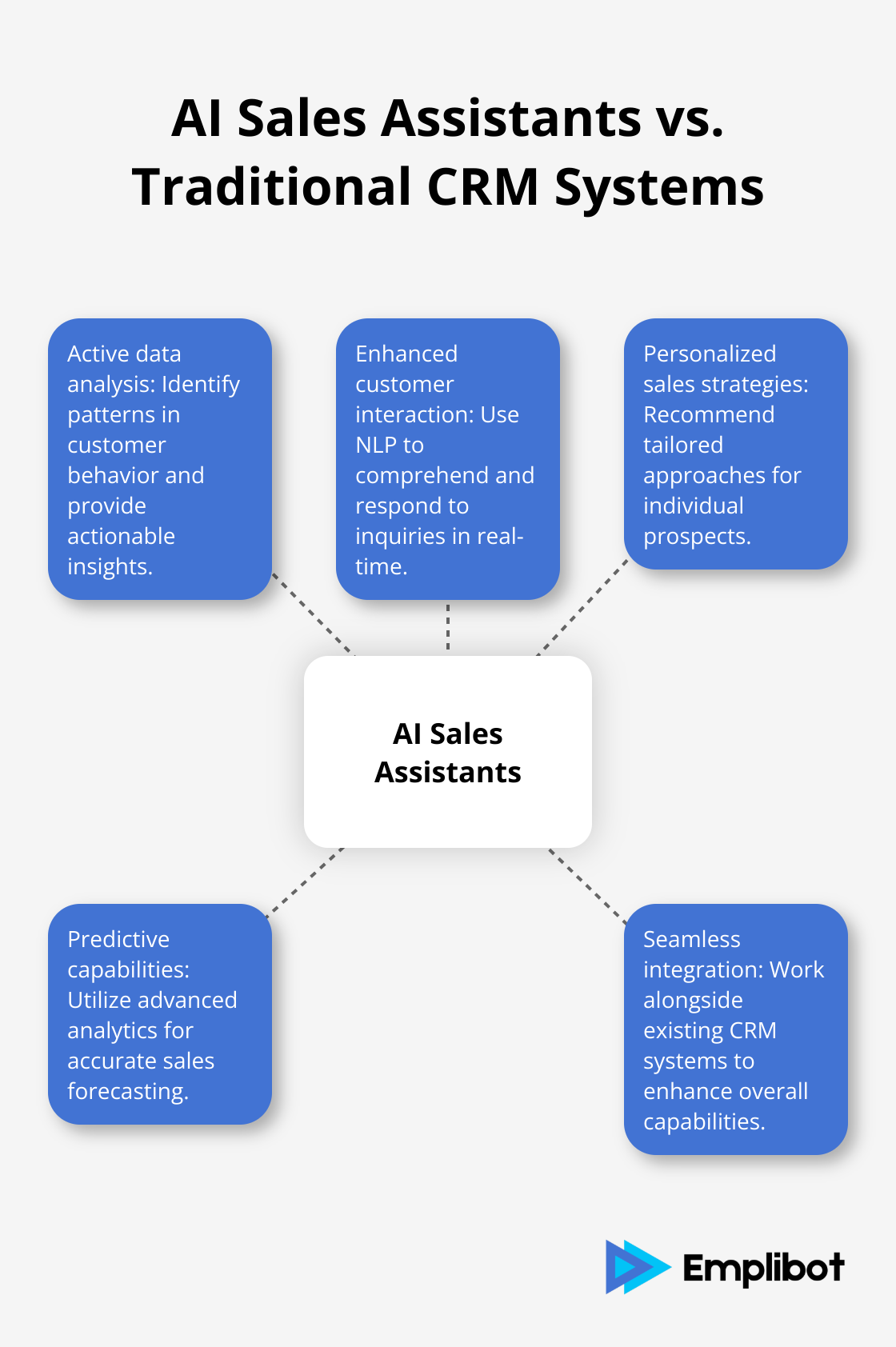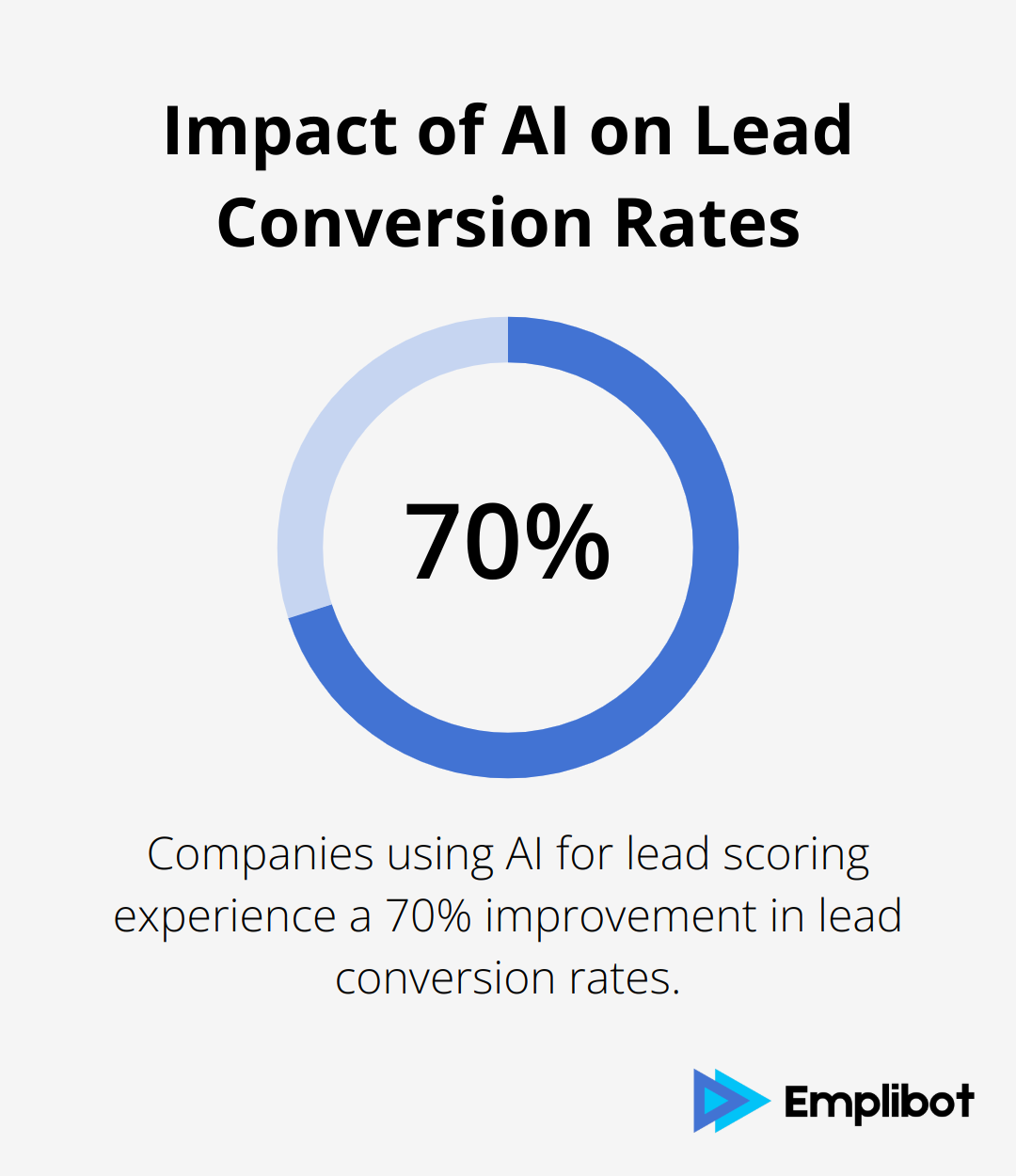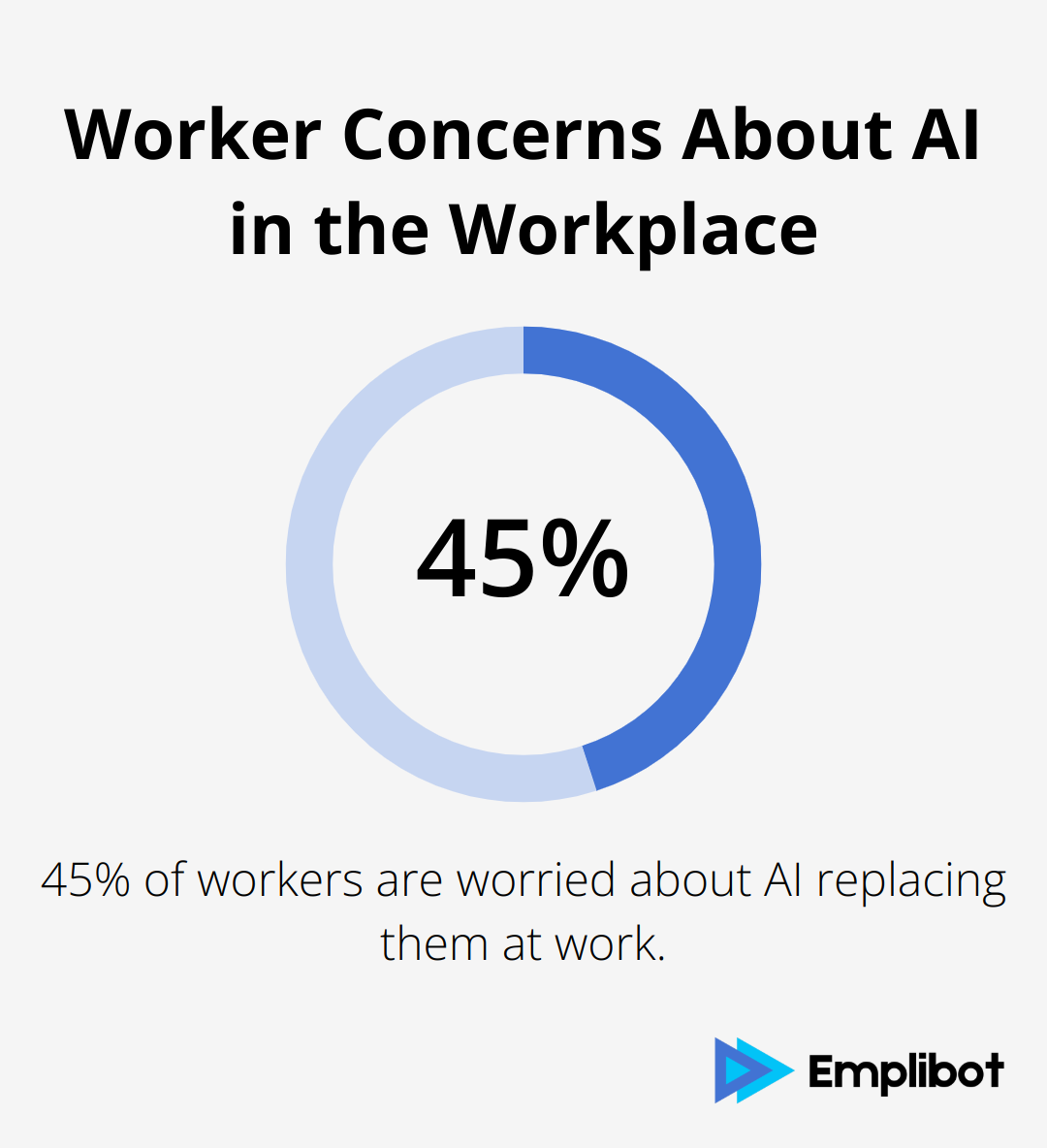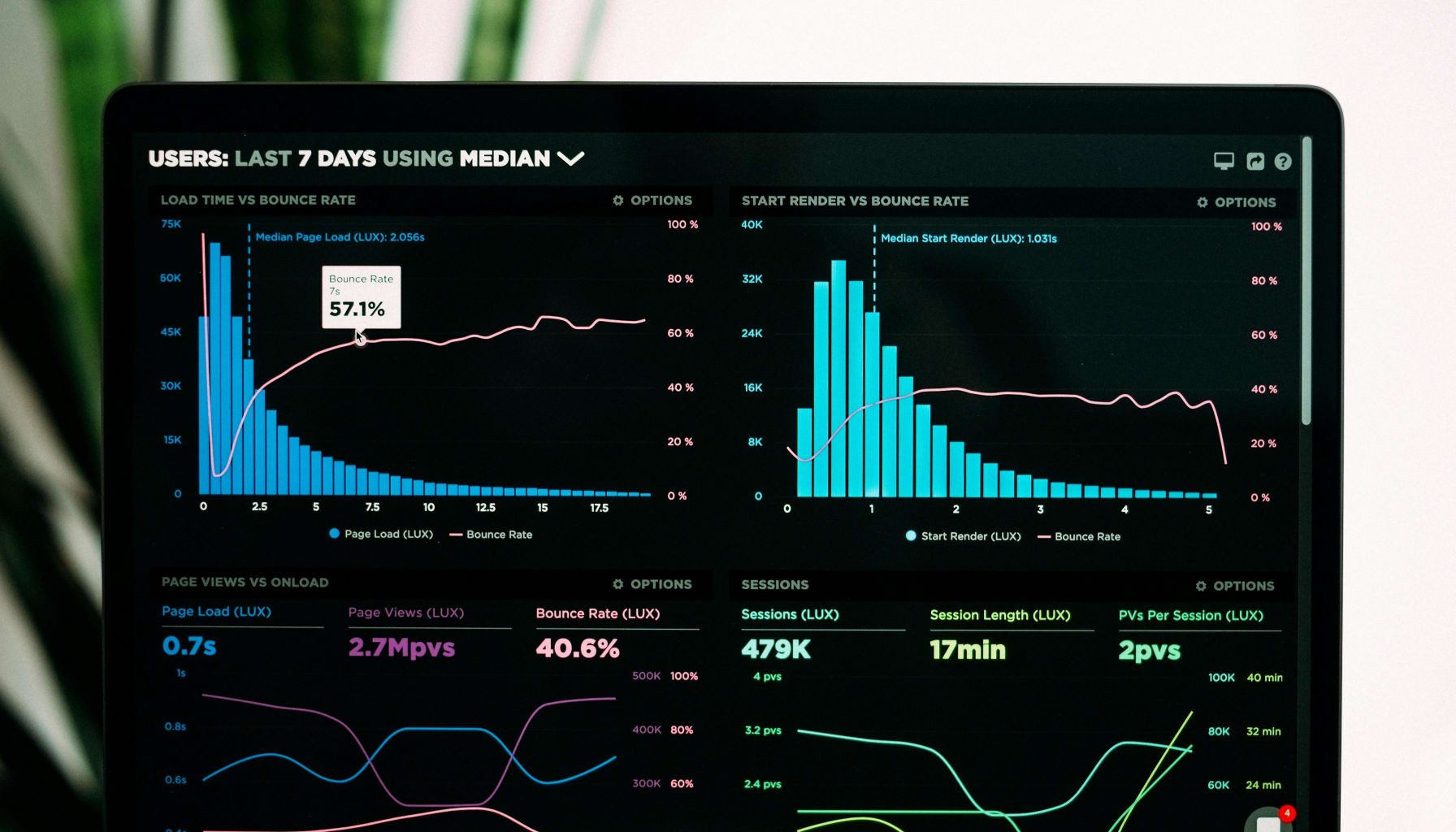At Emplibot, we’ve seen firsthand how AI sales assistants are transforming the way businesses operate. These powerful tools are revolutionizing sales workflows, automating tedious tasks, and providing invaluable insights.
In this post, we’ll explore how AI sales assistants can boost your team’s efficiency and drive better results. We’ll also share practical tips on implementing these game-changing technologies in your organization.
What Are AI Sales Assistants?
Core Functionalities of AI Sales Assistants
AI sales assistants are advanced software tools that use artificial intelligence to optimize various aspects of the sales process. These intelligent systems surpass traditional customer relationship management (CRM) platforms by offering sophisticated capabilities that significantly enhance sales team productivity and effectiveness.
AI sales assistants prepare for the future of ecommerce search and help create SERPs SEO strategies. They handle a wide range of activities, from lead qualification and follow-up scheduling to data entry and analysis. For example, an AI sales assistant can automatically log customer interactions, which allows sales representatives to dedicate more time to relationship building and deal closing.
Advanced Features That Set AI Sales Assistants Apart
Modern AI sales assistants boast features that can transform your sales workflow. AI-driven sales forecasting utilizes advanced predictive analytics to enhance the accuracy and efficiency of sales predictions. This technology leverages vast amounts of data to identify high-potential leads and forecast future sales trends.
Natural language processing (NLP) is another crucial feature, enabling these assistants to comprehend and respond to customer inquiries in real-time. This technology powers chatbots and virtual assistants to manage initial customer interactions, qualifying leads before they reach a human sales representative.
AI Sales Assistants vs. Traditional CRM Systems
While traditional CRM systems primarily store and organize customer data, AI sales assistants actively analyze that data to provide actionable insights. They identify patterns in customer behavior, suggest optimal follow-up times, and even recommend personalized sales strategies for individual prospects.
Moreover, AI sales assistants integrate with existing CRM systems, enhancing their capabilities rather than replacing them entirely. This integration creates a seamless workflow where AI-driven insights are readily available within the familiar CRM interface.

As we move forward, let’s explore the numerous benefits that implementing AI sales assistants can bring to your organization.
How AI Sales Assistants Boost Your Bottom Line
Supercharging Productivity Through Automation
AI sales assistants transform the sales process by handling repetitive tasks. They automatically log customer interactions, update contact information, and schedule follow-up calls. Generative AI’s impact on productivity could add trillions of dollars in value to the global economy. Your team can redirect this time to high-value activities like relationship building and deal closing.
These assistants also transcribe sales calls in real-time. This feature allows reps to focus on the conversation while capturing valuable data. It improves the quality of customer interactions and ensures no important details slip through the cracks.
Unlocking Data-Driven Insights
AI sales assistants analyze vast amounts of data and provide actionable insights. They identify patterns in customer behavior, suggest optimal follow-up times, and predict which leads will likely convert.
These assistants analyze factors such as past purchase history, social media activity, and industry trends to provide personalized recommendations for each prospect.
Personalizing Customer Engagement at Scale
AI-powered sales assistants enable hyper-personalization in customer interactions. They analyze a customer’s preferences, past interactions, and current needs to tailor communication and offers. A study reveals that companies using AI for lead scoring experience a 70% improvement in lead conversion rates.

These intelligent tools suggest the most effective communication channel for each prospect (email, phone, or social media). They also recommend the best time to reach out based on the prospect’s past behavior and industry norms.
Improving Forecasting Accuracy
AI sales assistants revolutionize sales forecasting. They analyze historical data, market trends, and individual rep performance to provide more accurate sales predictions.
This improved forecasting allows sales managers to make data-driven decisions about resource allocation, inventory management, and overall strategy. It also helps identify potential roadblocks in the sales pipeline before they become major issues.
As we explore the transformative power of AI sales assistants, it’s essential to understand how to effectively integrate these tools into your existing workflows. Let’s now turn our attention to the best practices for implementing AI sales assistants in your organization.
How to Successfully Implement AI Sales Assistants
Choose the Right AI Sales Assistant
Selecting an appropriate AI sales assistant requires careful consideration. Look for a solution that integrates seamlessly with your existing CRM and other tools. Evaluate options based on their specific features, such as lead scoring, predictive analytics, and natural language processing capabilities.
Consider your team’s specific needs and pain points. If your sales reps spend excessive time on data entry, prioritize an AI assistant with robust automation features. If improving customer engagement tops your list, focus on solutions with advanced personalization capabilities.
Prepare Your Team for AI Integration
The successful implementation of AI sales assistants depends on your team’s readiness to embrace new technology. A survey found that 45% of workers were worried about AI replacing them at work. However, proper training proves essential to capitalize on the potential benefits of AI.

Start by clearly communicating the benefits of AI to your team. Demonstrate how it will simplify their jobs and boost productivity. Provide comprehensive training on effective use of the AI assistant. This might include workshops, online courses, or one-on-one sessions with AI experts.
Set Clear Objectives and KPIs
To measure the success of your AI sales assistant, establish clear goals and key performance indicators (KPIs) from the outset. These might include metrics such as:
- Increase in sales productivity (number of calls made or emails sent per day)
- Improvement in lead conversion rates
- Reduction in time spent on administrative tasks
- Increase in customer satisfaction scores
Review these KPIs regularly and adjust your strategy as needed.
Prioritize Data Quality and Privacy
The effectiveness of your AI sales assistant depends heavily on the quality of data it processes. Implement rigorous data cleaning and standardization processes. Conduct regular audits of your data to ensure accuracy and completeness.
Privacy holds equal importance. With regulations like GDPR and CCPA in place, ensuring compliance becomes non-negotiable. Choose an AI sales assistant that prioritizes data security and offers features like data encryption and user access controls.
Prioritizing data protection not only ensures compliance with regulations but also builds trust with your customers.
Final Thoughts
AI sales assistants revolutionize business operations by automating tasks, providing data-driven insights, and enhancing customer engagement. These tools streamline workflows, improve decision-making, and help companies stay competitive in today’s market. However, AI sales assistants do not replace human representatives; they augment their capabilities and allow teams to focus on relationship-building and deal-closing.
The future of AI in sales and customer relationship management promises even more sophisticated features and capabilities. As AI technology evolves, we expect to see advancements in predictive analytics and natural language processing, making these assistants more adept at understanding and responding to customer needs. The adoption of AI sales assistants will lead to more efficient, data-driven, and customer-centric sales processes.
At Emplibot, we recognize the potential of AI sales assistants to transform sales workflows. Our focus remains on automating content creation and distribution, complementing the broader shift towards AI-driven sales processes. Companies that effectively implement these technologies will enhance their sales processes, improve customer relationships, and drive growth in an increasingly competitive marketplace.

